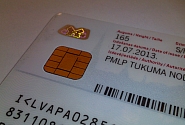
On Thursday, 10 June, the Saeima adopted in the final reading amendments to the Personal Identification Documents Law, whereby, starting from 2025, the eID card will be a mandatory personal identification document for persons living abroad.
Previously, the eID card was set to be a mandatory personal identification document for citizens or non‑citizens of Latvia who had attained 15 years of age and had provided data on their place of residence in a foreign country in accordance with the procedures laid down in the Population Register Law, starting from 2031.
The term was shortened so that persons living abroad could enjoy the opportunities offered by the eID card as soon as possible and were incentivised to opt for the eID card as well when applying for a new passport. As a result, the Latvian diaspora would be able to receive public administration services in a more convenient and secure way sooner, according to the explanatory note to the amendments.
The authors of the amendments noted that, to limit the spread of COVID‑19, most world countries have introduced various epidemiological safety measures, which affect the movement of people outside and within their borders and the availability of public services, among other things. Consequently, Latvia’s diplomatic missions and consular offices abroad have also been forced to reduce the number of visitors they receive and, in some cases, suspend the provision of in‑person consular services altogether.
The amendments were made to provide the Latvian diaspora with better access to electronic identification and e‑signature tools so that people would be able to use government services online.
The personal identification, or eID, card will be a mandatory personal identification document for the residents of Latvia starting from 1 January 2023.
Saeima Press Service







